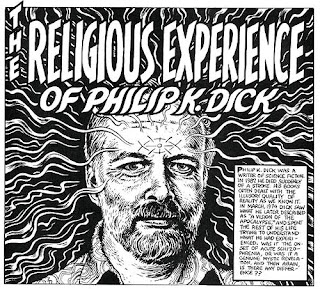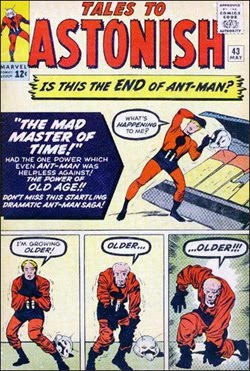 I've been blogging for a few years now, and over that time I've linked to Philip K. Dick related material a whole lot of times. Here, in honor of reading Dr. Bloodmoney this week, are just a few PKD highlights, all to the glory of the man Fredric Jameson once called "the Shakespeare of science fiction":
I've been blogging for a few years now, and over that time I've linked to Philip K. Dick related material a whole lot of times. Here, in honor of reading Dr. Bloodmoney this week, are just a few PKD highlights, all to the glory of the man Fredric Jameson once called "the Shakespeare of science fiction":
* "How to Build a Universe That Doesn't Fall Apart Two Days Later." In some ways this is the definitive PKD essay, and it's the one referenced somewhat famously at the end of Waking Life. [+/-]
It was always my hope, in writing novels and stories which asked the question "What is reality?", to someday get an answer. This was the hope of most of my readers, too. Years passed. I wrote over thirty novels and over a hundred stories, and still I could not figure out what was real. One day a girl college student in Canada asked me to define reality for her, for a paper she was writing for her philosophy class. She wanted a one-sentence answer. I thought about it and finally said, "Reality is that which, when you stop believing in it, doesn't go away." That's all I could come up with. That was back in 1972. Since then I haven't been able to define reality any more lucidly.* Another great essay at Grey Lodge Occult Review: "If You Find This World Bad, You Should See Some of the Others."But the problem is a real one, not a mere intellectual game. Because today we live in a society in which spurious realities are manufactured by the media, by governments, by big corporations, by religious groups, political groups—and the electronic hardware exists by which to deliver these pseudo-worlds right into the heads of the reader, the viewer, the listener. Sometimes when I watch my eleven-year-old daughter watch TV, I wonder what she is being taught. The problem of miscuing; consider that. A TV program produced for adults is viewed by a small child. Half of what is said and done in the TV drama is probably misunderstood by the child. Maybe it's all misunderstood. And the thing is, Just how authentic is the information anyhow, even if the child correctly understood it? What is the relationship between the average TV situation comedy to reality? What about the cop shows? Cars are continually swerving out of control, crashing, and catching fire. The police are always good and they always win. Do not ignore that point: The police always win. What a lesson that is. You should not fight authority, and even if you do, you will lose. The message here is, Be passive. And—cooperate. If Officer Baretta asks you for information, give it to him, because Officer Beratta is a good man and to be trusted. He loves you, and you should love him.
So I ask, in my writing, What is real? Because unceasingly we are bombarded with pseudo-realities manufactured by very sophisticated people using very sophisticated electronic mechanisms. I do not distrust their motives; I distrust their power. They have a lot of it. And it is an astonishing power: that of creating whole universes, universes of the mind. I ought to know. I do the same thing. It is my job to create universes, as the basis of one novel after another. And I have to build them in such a way that they do not fall apart two days later. Or at least that is what my editors hope. However, I will reveal a secret to you: I like to build universes which do fall apart. I like to see them come unglued, and I like to see how the characters in the novels cope with this problem. I have a secret love of chaos. There should be more of it. Do not believe—and I am dead serious when I say this—do not assume that order and stability are always good, in a society or in a universe. The old, the ossified, must always give way to new life and the birth of new things. Before the new things can be born the old must perish. This is a dangerous realization, because it tells us that we must eventually part with much of what is familiar to us. And that hurts. But that is part of the script of life. Unless we can psychologically accommodate change, we ourselves begin to die, inwardly. What I am saying is that objects, customs, habits, and ways of life must perish so that the authentic human being can live. And it is the authentic human being who matters most, the viable, elastic organism which can bounce back, absorb, and deal with the new.
Of course, I would say this, because I live near Disneyland, and they are always adding new rides and destroying old ones. Disneyland is an evolving organism. For years they had the Lincoln Simulacrum, like Lincoln himself, was only a temporary form which matter and energy take and then lose. The same is true of each of us, like it or not.
We are accustomed to supposing that all change takes place along the linear time axis: from past to present to future. The present is an accrual of the past and is different from it. The future will accrue from the present on and be different yet. That an orthogonal or right-angle time axis could exist, a lateral domain in which change takes place -- processes occuring sideways in reality, so to speak -- this is almost impossible to imagine. How would we perceive such lateral changes? What would we experience? What clues -- if we are trying to test out this bizarre theory -- should we be on the alert for? In other words, how can change take place outside of linear time at all, in any sense, to any degree?
 * R. Crumb's comic, "The Religious Experience of Philip K. Dick."
* R. Crumb's comic, "The Religious Experience of Philip K. Dick."* The first law of kipple is that kipple drives out nonkipple.
* Philip K. Dick and drugs.
* Philip K. Dick on Kurt Vonnegut. [+/-]
Interviewer: What did you think of Vonnegut’s attitude towards his characters (in Breakfast of Champions)?* Philip K. Dick and the Kennedy Assassination. (Warning: spoilers for the last book we're going to read this semester, also a Dick novel, Dr. Futurity.)
PKD: Disgusting and an abomination. I think that that book is an incredible drying up of the liquid sap of life in the veins of a person like a dead tree…that’s what I think. I also love Kurt Vonnegut.
* Profiles of Philip K. Dick from The New Yorker, The Washington Post, and the Times. Interviews with Philip K. Dick. Lethem on Philip K. Dick. Again. Stanislaw Lem on PKD.
* Jameson on Dr. Bloodmoney.
(cross-posted at culturemonkey)




|